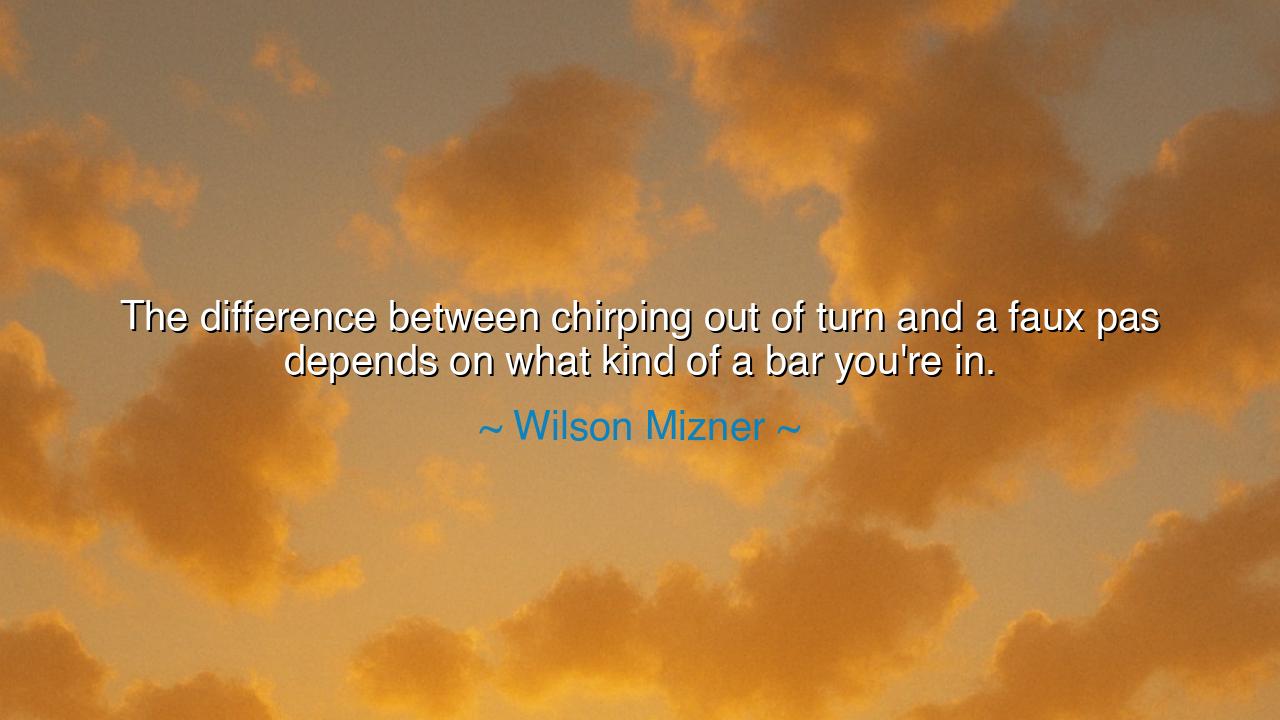
The difference between chirping out of turn and a faux pas
The difference between chirping out of turn and a faux pas depends on what kind of a bar you're in.






Words are like arrows, swift and sharp, and once released they cannot be recalled. When Wilson Mizner declared, “The difference between chirping out of turn and a faux pas depends on what kind of a bar you're in,” he spoke with wit, yet beneath his humor lies profound wisdom about context and perception. What is seen as bold and daring in one place may be seen as clumsy or offensive in another. Thus, the value of speech does not rest in the words alone, but in the setting, the company, and the moment in which they are spoken.
This truth has been understood since ancient times. The wise of old taught the importance of timing and discernment. In the courts of kings, a single poorly chosen word could mean death, while among commoners, the same jest might inspire laughter. Mizner’s saying reminds us that social rules are fluid, shaped by the customs and energy of a place. A tavern of warriors may cheer a bawdy jest, while a hall of scholars may condemn it as vulgar. To speak wisely, one must not only know the language of words but also the language of the environment.
History offers countless examples of those who thrived—or fell—through their words. Consider Socrates, who questioned the powerful men of Athens. His words were not inherently treacherous, but spoken in the wrong place, before the wrong audience, they became his undoing. Likewise, Winston Churchill once turned a room in his favor through sharp wit, proving that a single statement can shift from offense to glory, depending on the crowd and their expectations. Speech is like fire: it can warm the hearth or burn the house, depending on how and where it is kindled.
The "bar" Mizner speaks of is more than a drinking house—it is a symbol of society’s many circles. Some environments thrive on raw honesty and unrestrained laughter, while others demand restraint, diplomacy, and poise. A man who chirps out of turn among equals may be celebrated for his boldness, but the same act in the halls of power could brand him a fool. Thus, wisdom lies not only in knowing what to say, but when to remain silent.
To master speech is to master influence. Words can open doors or close them forever, and the wise speaker listens before speaking, discerning the nature of those around him. Like a sailor reading the winds before setting sail, he studies the mood of the room, shaping his voice to match the tides of the moment. In this way, even the most dangerous waters may be navigated with grace.
Let this lesson be passed down: speech is a weapon and a gift, and its impact depends upon the arena in which it is wielded. Mizner, through humor, teaches that survival and success are not merely about truth or cleverness, but about awareness. Speak as the moment demands, and your words shall build bridges instead of burning them.






AAdministratorAdministrator
Welcome, honored guests. Please leave a comment, we will respond soon